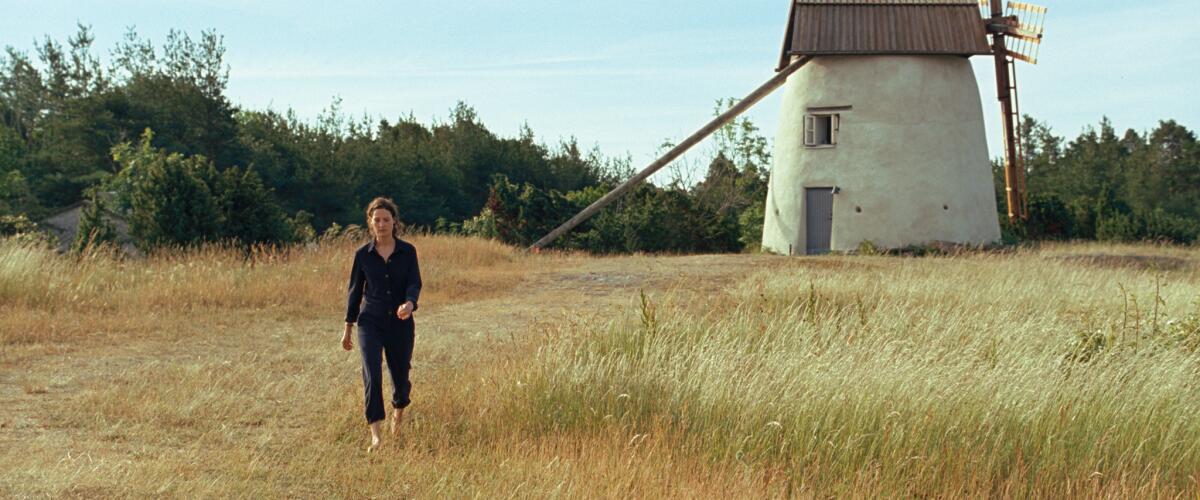For ‘Bergman Island,’ Vicky Krieps finds her own way into Ingmar Bergman

When Luxembourg-born actress Vicky Krieps agreed to star in “Bergman Island,” the seventh film from French director Mia Hansen-Løve, it meant coming to terms with two complications. First, she wasn’t the director’s first choice: The role of Chris — a filmmaker married to another, more prominent, filmmaker — had initially been cast with Greta Gerwig, who dropped out to direct “Little Women.” And second, the film would have to begin shooting before the crucial co-lead role (of the protagonist’s husband) was cast.
“I said yes right away,” Krieps says, “which was kind of crazy.”
Krieps flew out to the island of Fårö, where Swedish director Ingmar Bergman lived and made much of his work, and put her trust in Hansen-Løve. “I realized that I really didn’t know who my husband is. It wasn’t only that he’s not here now, but there’s no guy to even think about. So I started doing this weird kind of dialogue with the landscape and with the ghost of Bergman.”
A full year later, she returned with Tim Roth as her official co-lead, and the two got to work on a beguiling shape-shifter of a film about art, the creative process, ghosts and the evolution of a marriage.
Speaking via Zoom from Greece, in a room where her two children were sleeping, Krieps reflected on a deeply personal film that represents a “leap into the unknown.”
This is in many ways a film about place. How were you impacted by being on Fårö?
Fårö is a very mysterious, mystical place. It has a weird kind of strong energy, although there’s nothing there — it’s really very sparse. Me and Mia, we speak about it a lot, how much we miss the place. We actually miss Fårö like you miss a lover or something.
So you can understand the appeal of moving to an island and making all your films there.
Oh, yes, I would definitely. But I wouldn’t go alone — and [Bergman] didn’t. Even if he was lonesome, this creative director cowboy guy, he always had a woman at his side.
This was your first project after “Phantom Thread,” which was a significant breakthrough for you. How did that film impact the way you approach new roles?
After “Phantom Thread,” I had to find my way back into my life, just, like, [place] my feet onto the ground again, because it had been such an intense, magical, beautiful experience. So of course it would affect every movie I would ever do after. Paul [Thomas Anderson] and Daniel [Day-Lewis] both taught me that you can be your own artist, and you have your own voice, and you can express it.
From “Phantom Thread” on, I felt like, “Oh, I don’t have to always adapt, or feel obliged, like I have to fit in. I can express my own vision.” Working with Paul, I knew instinctively: This is special, and I’m probably not going to meet a director like you ever again.
“Bergman Island” is very intimate and personal, because I used the film to free myself after “Phantom.” “Phantom” gave me strength, but it was also a huge shadow. Like, “Now that you’ve done this movie, what are you going to do next?”
Your character is connected to Mia Wasikowska’s character, just as she is also connected to the filmmaker Mia Hansen-Løve. Did you and Mia Wasikowska think about how you contrasted and complemented each other’s performances? Did you watch each other on set?
We didn’t at all. It was a leap into the unknown. Me and Mia and Mia never talked about the fact that the three of us would be connected, because my character Chris is as much Mia as Mia’s character is Mia. So we actually never talked about it, but I could feel that we were aware. And we even wear the same costume, you know?
Mia’s films are often about detours, about going off the expected path. It makes them as unpredictable as an action movie.
Exactly. And the movie starts with Tony typing in the navigation, and Chris not using the navigation, and taking the detour. It’s about letting go of the idea that you have a way to go. Maybe your way is to let go and trust some unknown force.
This film interrogates Ingmar Bergman as much as the island celebrates him. Do you have a connection to Bergman, and did it change over the course of making this film?
I knew [his work] of course, as an actress, and a cinephile, and as a teenager. But I think I was too young — it was too intense for me.
For “Bergman Island,” I decided not to watch his movies, almost like challenging him. And then of course I met someone I never knew existed before, because when you go to Fårö, the place resonates with Bergman, because you know these landscapes, and the energy from his movies, and you enter the house, and you see his kitchen, and his DVD collection. Somehow everything surrounding him is still so alive, you feel like you meet him.
More to Read
From the Oscars to the Emmys.
Get the Envelope newsletter for exclusive awards season coverage, behind-the-scenes stories from the Envelope podcast and columnist Glenn Whipp’s must-read analysis.
You may occasionally receive promotional content from the Los Angeles Times.







